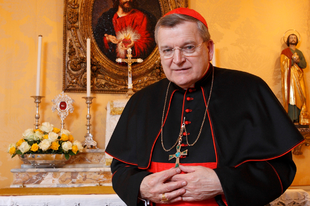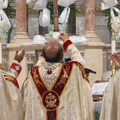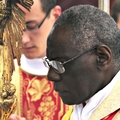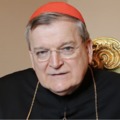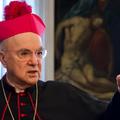It is our pleasure and a great honor that His Eminence Raymond Leo Cardinal Burke has granted an exclusive interview to the Hungarian independent Catholic news and commentary site, Katolikus Válasz.
This interview was conducted in a written form and the questions were sent to His Eminence on August 24. We are now pleased to publish Cardinal Burke's answers.
Due to the length of the interview, we have decided to publish it in two parts. Below is the first part; we are planning to publish the second part on Friday, September 8.
The topics we touched in this first part include Cardinal Burke's thoughts on the Hungarian Church, his currently ongoing services as a cardinal, and questions related to Amoris Laetitia, the Dubia, and the possible formal correction of the ongoing confusion in the Church induced by Amoris Laetitia.
Kattints ide az interjúrészlet magyar fordításáért!
Miklos Szerdahelyi
editor-in-chief, Katolikus Válasz
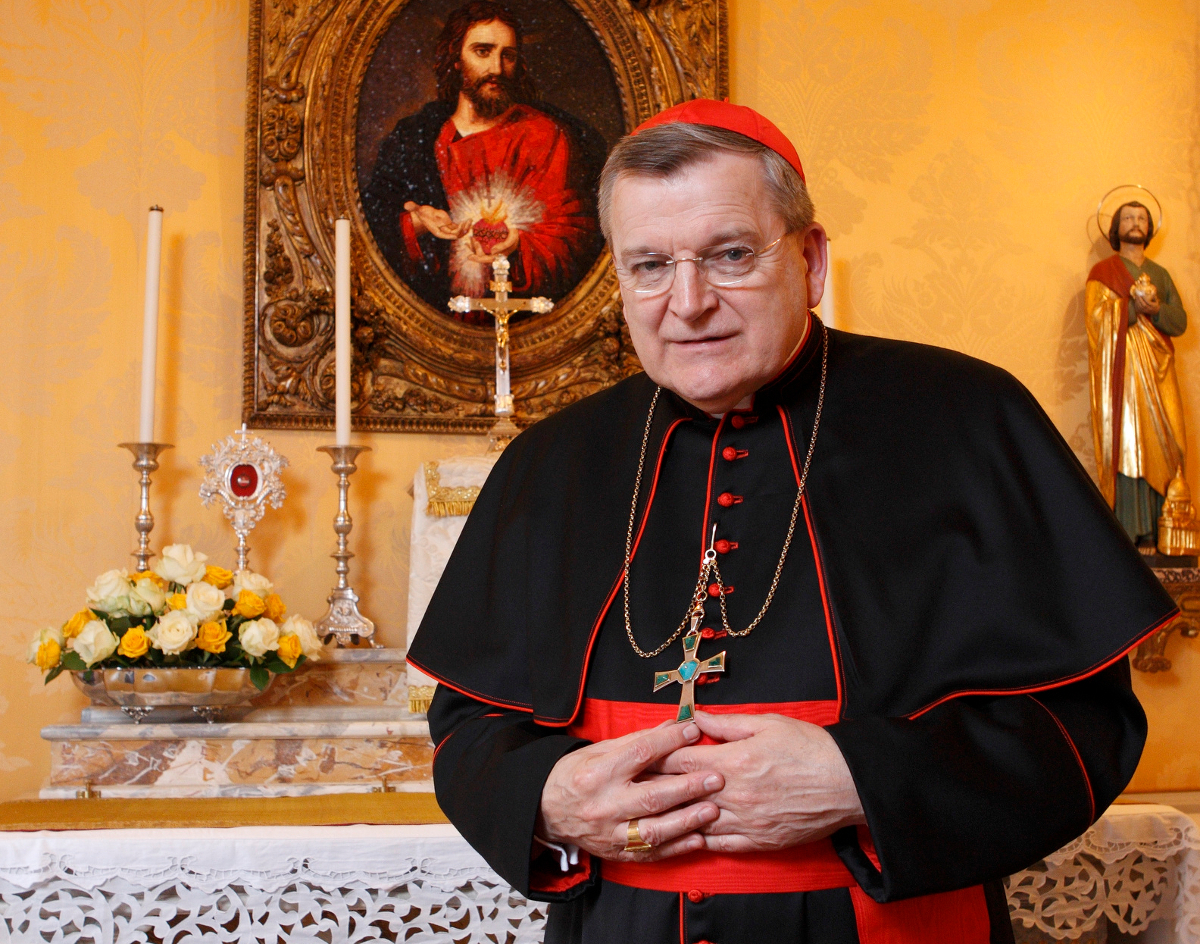
About His Eminence and His thoughts on the Church in Hungary
Katolikus Válasz: This is the first time you are giving an interview to a Hungarian Catholic media outlet. Do you have any experience with regard to the Church in Hungary, with Hungarian bishops, and with Hungary in general? What are your impressions about us?
Cdl. Burke: I have never had the pleasure of visiting Hungary, but I have been aware of Hungary and especially of Catholicism in Hungary from my childhood, when we were informed of the suffering of Hungarian Catholics and especially of Cardinal Joseph Mindszenty under the regime of atheistic communism.
During my years of study of Canon Law at the Pontifical Gregorian University, the then Father Peter Erdő was one of the professors, and, even though I did not have him as a professor, I knew well of his excellent reputation as a scholar and had occasion to study his writings. Since becoming a member of the College of Cardinals, I have had occasion to visit with Cardinal Erdő whom I highly respect.
My impression is that Hungary, like other nations who have courageously defended their Christian origins and identity, is fighting the "good fight" (cf. 2Tim 4,7) against the relentless pressure of atheistic secularization, especially from the European Union.
Sadly, devout Hungarian Catholics, like Catholics everywhere, also have to fight the secularization which has entered into the Church and corrupts worship, doctrine and moral practice.
On the occasion of Solemn Holy Masses which I have offered or presentations which I have given in Austria and in countries of Eastern Europe, Hungarian Catholics have made the sacrifice to be present and have visited with me about their legitimate concerns for the world and the Church. In fact, today’s secularization is the fruit of the spread of atheistic communism during the last century, and the battle of today’s Hungarian Catholics is rightly seen in continuity with the heroic witness of Hungarian Catholics of former times.
It is my hope to get to know better the Church in Hungary.
Katolikus Válasz: Where and with what type of service are you spending your time nowadays as a cardinal of the Church? The last public reports on this said that you are on a judicial assignment in Guam. Is this service still ongoing? How much does it require your permanent stay in Guam?
Cdl. Burke: I serve on the Congregation for the Causes of Saints and the Pontifical Council for Legislative Texts. Each month, there is a meeting of the Congregation for Causes of the Saints with much printed material on individual Servants of God to study before the meeting.
I also still have the title of Cardinal Patron of the Sovereign Military Hospitaller Order of Saint John of Jerusalem of Rhodes and of Malta, but, earlier in the year, Pope Francis gave all of my responsibilities to Archbishop Giovanni Angelo Becciu. Thus, I have the title but, at present, no function.
The Prefect of the Congregation for the Doctrine of the Faith asked me to serve as the Presiding Judge in a college of five judges to hear the penal cause brought against the Archbishop of Agaña in Guam. I accepted the responsibility which involved several months of taking testimonies and gathering other proofs, so that the judges could make a judgment in accord with the truth. Within a short time, I should have completed that exceptional work. The work has never involved my residing in Guam. I went there for three days to take testimonies and seek other proofs but have not returned there.
I travel a great deal to teach the faith and to offer the Pontifical Holy Mass on special occasions.
About Amoris Laetitia and the possible correction of Pope Francis's teachings
Katolikus Válasz: Some prominent voices in the Hungarian Church and in the Vatican (e.g. Msgr. Pio Vito Pinto in a 2016 interview) have claimed that all the teachings included in Pope Francis’s post-synodal apostolic exhortation, Amoris Laetitia, reflects what the bishops at the 2014 and 2015 synods on the family supported with a majority vote. Is this true?
Cdl. Burke: The members of both sessions of the Synod voted on certain propositions. The results of the votes have been published. The text of Amoris Laetitia is based on what happened at the two sessions, but it cannot be said that the teaching contained in it is the teaching of the members of the Synod. The Synod of Bishops gives consultation to the Pope. What he publishes is his teaching.
Katolikus Válasz: Many of us have an understanding that even though Amoris Laetitia (especially its 8th chapter dealing with the issue of irregular matrimonial unions) contains ambiguous statements that are open for heterodox interpretations, nevertheless even these statements (and Amoris Laetitia as a whole) can be understood as being completely in line with the previous teaching of the Magisterium. Thus, it is not Amoris Laetitia but the interpretations provided by individual bishops and episcopal conferences that are erroneous and contradictory in some points they make. Do you agree with this understanding of the situation?
If so, why are you suggesting a formal correction of the Pope, instead of formal corrections of these bishops and episcopal conferences?
Cdl. Burke: The fact that certain passages in Amoris Laetitia have given way to confused and contradictory interpretations is a difficulty in itself. There are passages which, in fact, call into question certain fundamental teachings of the Church and thus have generated contradictory understandings of the Church’s teaching on the Holy Eucharist and Holy Matrimony, and on acts which are intrinsically evil and, therefore, can never be justified. Since the Petrine Office has the responsibility to teach the Catholic faith with integrity and thus maintain the unity of the Bishops and all the faithful, the correction of the confusion and error is the responsibility of the Roman Pontiff. That is why the dubia or questions were respectfully directed to Pope Francis as an aid to him in carrying out his weighty responsibility. To provide such assistance to the Holy Father is at the heart of the responsibility of the College of Cardinals.
Katolikus Válasz: In your recent interview with The Wanderer you claim that “the Holy Father would be obliged to respond” to a possible formal declaration of correction. What do you exactly mean by this?
Do you expect other bishops and cardinals to openly sign such a declaration with the dubia cardinals?
Cdl. Burke: Since a formal correction would treat a fundamental teaching or fundamental teachings of the Catholic faith, it would require the Pope to fulfill his solemn duty to teach what the Catholic Church has always taught and practiced.
I cannot say what other Bishops and Cardinals may do. Regarding the formal correction, it is not a matter of the number of persons who make the correction but of the truth of the correction itself.
Katolikus Válasz: In his recent article, Abp. Víctor Manuel Fernández - quite clearly referring to the dubia cardinals - accused the Pope's critics with "intellectual Pelagianism", and with preparing "a death trap": a system of arguments "by an oligarchic group of ethicists" in which "the Scriptures are only there to illustrate the logic". According to the archbishop, “it is far easier to apply black-and-white norms, without taking into account complex realities and concrete lives, but ‘that comfortable rigidity can be a betrayal of the heart of the Gospel.’"
How would you respond to these statements?
Cdl. Burke: The question is what truth did Our Lord Himself teach in the Gospel and what has the Church always taught, in fidelity to the Word of Christ. That truth and living according to that truth alone will make individual Christians free and happy. Acting in a way contrary to that truth not only does not bring freedom and happiness but can also cause others to fall into error. Encouraging another to act in a way contrary to that truth is not a sign of Christian love and compassion which require each of us to help each other, even in complex and difficult situations, to respond to grace and so to live the truth.

